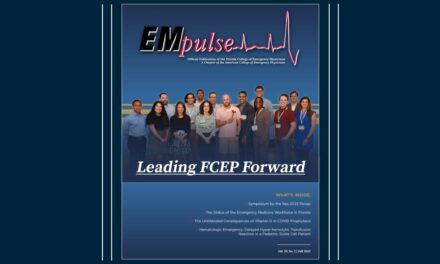
Fall 2022: FCEP President’s Message: What You Can Accomplish Through Our Organization
During my eleven years of being involved at the Florida College of Emergency Physicians, I have seen just how much we can accomplish by working together towards common goals. Unfortunately, because so much of the work occurs behind the scenes, it’s striking how little physicians know about what organized medical groups such as FCEP do on their behalf.
Here in Florida, members of FCEP literally wrote language in the Florida Balance Billing Law (now part of the Florida Constitution), which established out-of-network reimbursement (read—what you and I get paid) at usual and customary charges. That little change might not mean much to most physicians, but it was a huge victory that took hundreds of hours of uncompensated work by FCEP physicians and staff to lobby on behalf of physicians in Tallahassee. It basically established that physicians and their groups have the right to fairly negotiate with insurers and gave us a recourse to hold them accountable when they under-reimburse physicians. Had original language in the Florida Balance Billing Bill passed in 2017, Florida emergency physicians would be looking at minimum 10% reimbursement cuts from insurers.
Last year we saw the passage of the No Surprises Act (NSA), which further banned balance billing from physicians to patients. The bill’s original language, confirmed by a Congressional Budget Office (CBO) budget estimate, would have put a reimbursement ceiling on hospital-based physicians and cut our pay 20% over 10 years. Given that the average emergency physician salary is approximately $342,000, ACEP – working along with other organized medicine partners – saved every emergency physician approximately $68,000/year.
Yet a common refrain I hear from many physicians is, “what does FCEP do for me?” or “why should I pay to be in FCEP when they don’t speak for me?” This cynical attitude is often erroneously repeated on social media and in conversations I have with clinical physicians. Truth be told, the only thing keeping physicians from a complete corporate take-over where everyone is employed by either a giant corporation, hospital, or (worst yet), a health insurer, is organized medical groups such as FCEP. While it may seem that physicians have been on the ropes for a while and the end of physician-led healthcare in the U.S. is nearing, here are some of the victories FCEP (and ACEP nationally) has helped lead in the past five years:
- Changed NSA language, which would have cut physicians reimbursement 20%
- Gave Florida Independent Dispute Resolution (IDR) for out-of-network bills instead of the proposed health insurer benchmarks, which would have set a price ceiling for all reimbursement at insurer-determined in-network levels.
- Successfully opposed full independent practice authority to nurse practitioners and physician assistants in the ED and hospital setting.
- Changed the “pelvic law” to get rid of written consent for pelvic exams
- Allowed opioids to be written for “short-term pain” when initially the Legislature proposed banning all opioid prescriptions written in an ED setting.
- Fixed a law which would have made it illegal to render medical care to a minor without parental consent
- Protected Florida Auto-Insurance Physician Med-pay, which insures $5,000 payment for physician services in all insured motorists seen in the ED. The proposed bill would have cut trauma center physician reimbursement an estimated 6-8%.
- Changed a law which would have ended all paper prescriptions for physicians in Florida to allow exceptions.
- Expanded MAT opioid treatment and funding in Florida
- Started a workforce study group that will help examine potential oversupply or maldistribution of emergency physicians in Florida and seek to standardize baseline EM residency training requirements.
In addition to fighting for physician autonomy and rights, FCEP has also managed to host yearly residency programs such as SimWars, CPC competitions, and Life After Residency, along with Symposium by the Sea, EMS CLINCON, and other EMS and EM educational programs. FCEP is the most equipped organization for improving emergency care in Florida — it’s the best way for emergency physicians to get plugged into a “problem-solving network” to fix the problems ailing emergency care in our state. In addition, FCEP puts emergency physicians in the position to fight for fair pay and oppose billion-dollar, conglomerate U.S. health insurers, which take in over $1 trillion in revenue per year.
Unfortunately, doctors have let corporate and commercial interests hijack the U.S. healthcare system. As a $5 trillion industry, U.S. healthcare is now the 5th largest economy in the world. The more money involved, the more you can expect outside forces to strip physicians of autonomy and power in a manner that will most economically benefit them at the expense of physicians and proper patient care.
FCEP is the way in which we can oppose outside forces deterring the physician-patient relationship. If you have a problem which hinders your care in the ED, reach out to us — we will get you in contact with the person who can help address that problem, and help improve your experience as an emergency physician. Now more than ever, physicians need to band together to fight for physician and patient rights, autonomy, fair compensation, and against encroachment by greedy, non-medical entities looking to make money. To paraphrase JFK, ask not what FCEP can do for you, but what you can do through FCEP.
This article is part of the following sections:




